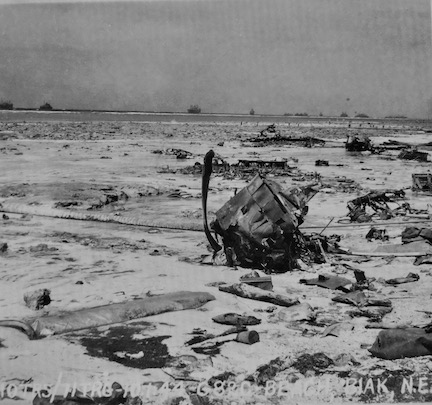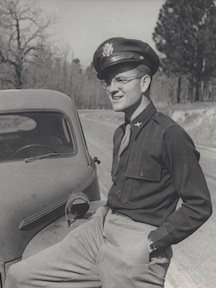By Allen Boyer
When my father talked about the war, it was at night, on an empty highway. We lived in Mississippi, all our relatives lived in Indiana, and we made that long round-trip twice a year. After dark, hours behind us, hours still to go, my father would stretch his arms, shift in the driver’s seat, and talk about New Guinea and the Philippines. My mother said he did it to keep awake.
When I was growing up, the Pacific War histories I read were about American fighter planes dog-fighting with Zeros. My father’s war stories weren’t like that. He talked about recklessness and accidents and waste. One pilot he knew crashed while dropping leaflets, because the leaflets were sucked into his plane’s air intake. Another pilot killed himself trying to dip his wingtips in the tall kunai grass.
There was irony, but none of it was cheerful. My father told how a bomber crew died on a mission to drop maps to infantry on a beachhead. Nervous American anti-aircraft gunners saw their plane coming in low and fast, saw that the bomb-bay doors were open, didn’t wait to check the markings, and shot them down.
My father talked about the beachhead at Biak, where the airstrip was a no-man’s-land. His air group was on the side by the beach, and the Japanese were holed up in the hills and caves across the runway. At another beachhead, on Mindoro in the Philippines, there was one very bad night, when Japanese destroyers raced in and shelled the airfield. He drove a jeep to the airstrip, and they got the planes armed, lugging bombs and heavy belts of machinegun ammunition, while Japanese planes dived in and strafed them. The next day, of the five lieutenants in his tent, he was the only man still alive.
While he was overseas, my father kept a diary. I read it when I was fourteen and I thought it spoke pithily about the absurdity of war and the rigmarole of military life. Which it does – but three years ago, when I started turning the diary into a book, I found that the daily entries didn’t speak for themselves.
My father’s stories checked out against the squadron records. I learned the names of the pilots who had died: Lieutenant Swanson when the leaflets clogged his air intake, Lieutenant Minton doing the wingtip-dipping air-show stunt, Captain Hancock and his crew killed by mistake. But if the history was straightforward, assembling the memoir took work. My father grew up on a farm in Indiana, where diaries were for recording what happened, not how you felt about it. Just as he hadn’t talked about the war later, there were parts of the war that he hadn’t written about at the time. He had written about one notebook page a day, usually less than 300 words. From those brief lines, I had to infer a war’s worth of impact and emotion.
I had one advantage. Researching your father’s life is the mirror image of raising a child: you can look back from the matured personality you know and recognize the moments when a trait first showed itself. I knew that my father would teach Sunday school for twenty years. That cued me to pay attention when he wrote about going to church, often twice on Sunday (and the one time when he disagreed with what the chaplain was preaching, and walked out).
I could pick out his friends. They were the lieutenants from whom he heard rumors and who drove around with him in jeeps – other young men a couple of years out of college. There was Kepler the radar officer, with whom he traded gripes about Colonel Hutchison, and Foliart, who was there that night in Sydney when they commandeered the trolley-car.
My father was level-headed, a math major turned radio officer, not a man to talk about dreams or ghosts. So it mattered when he wrote about a ghost, a fraternity brother who had died at Midway. He dreamed that they met again back at college (“and as usual his hand grip was crushing,” he added). That dream came to him as his troopship steamed into the war zone – and that mattered, too. As he moved toward the war, he was grappling with its ghosts.
My father didn’t talk about being in love, but I knew he would marry my mother after the war and spend sixty years with her. When he tapped out a letter to her on the teletype in his radio truck, I knew how to read it: “This is fun, writing you, seeing the country, all I need is an ice cream cone and a blue-eyed girl on my right, one on my left always cramps my style if I had one.” He was joking; he was love-struck.
Stray remarks went in, remembered conversations, lines from a few letters. It was enough. My mother read the galley proofs and laughed out loud; she could just hear him saying that, she said.
Her laugh meant that the book had been worth writing. And perhaps I honored my father in one further way. When I think about writing his story, I remember writing it late at night, when the world is dark and quiet, and the story is what keeps you going.

Photo at top: Lt. Roscoe A. Boyer, on a roadside in Mississippi, in May 1943. Above is a photo Lt. Boyer brought back from the Pacific, of the beach at Biak, taken in the summer of 1944. (It is unclear if the engine is from Captain Hancock’s bomber.)
Allen Boyer (ΦBK, Vanderbilt University, 1977) is a lawyer and writer in New York City. His fifth book, Rocky Boyer’s War: An Unvarnished History of the Air Blitz that Won the War in the Southwest Pacific, has been published by the Naval Institute Press. Vanderbilt University is home to the Alpha of Tennessee Chapter of Phi Beta Kappa.Boy




